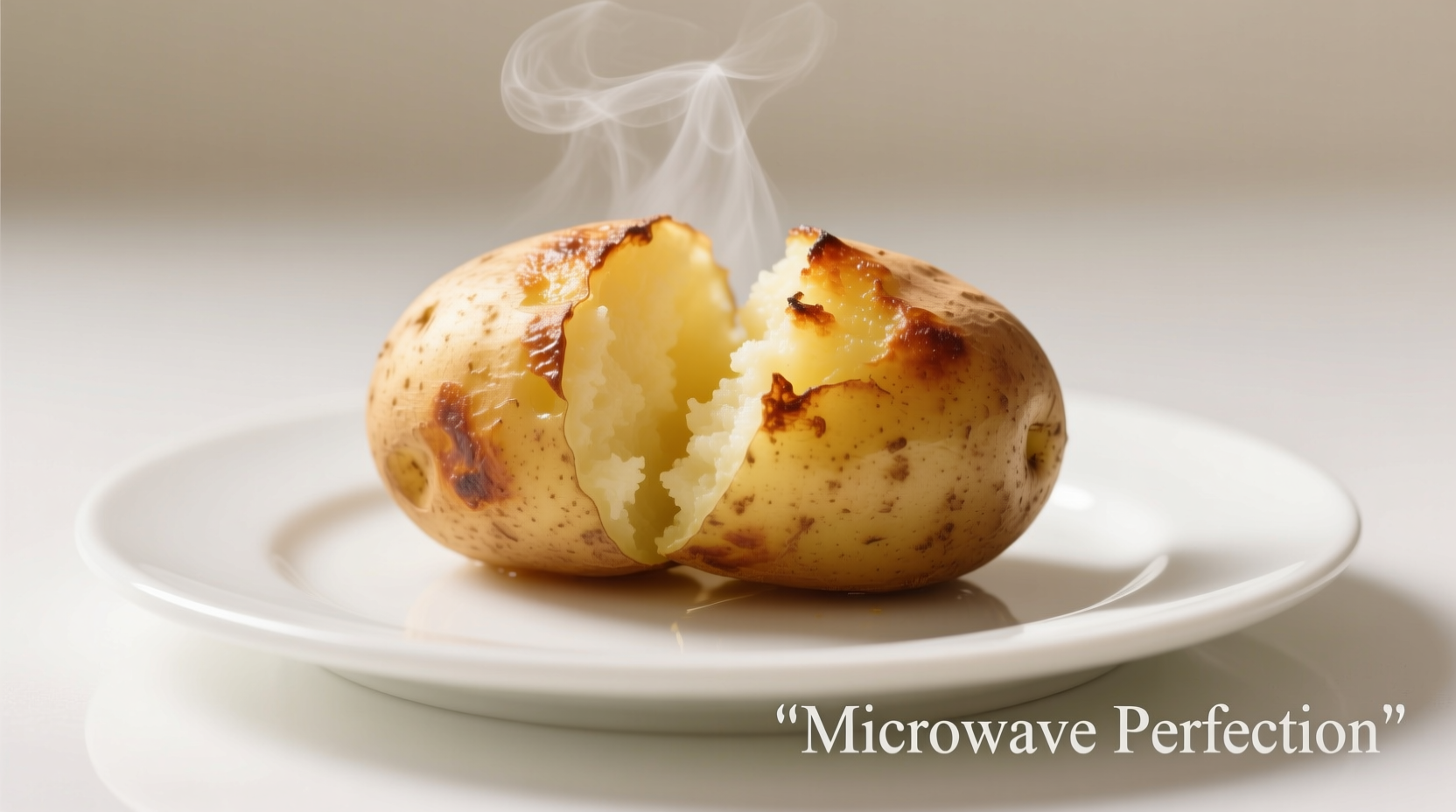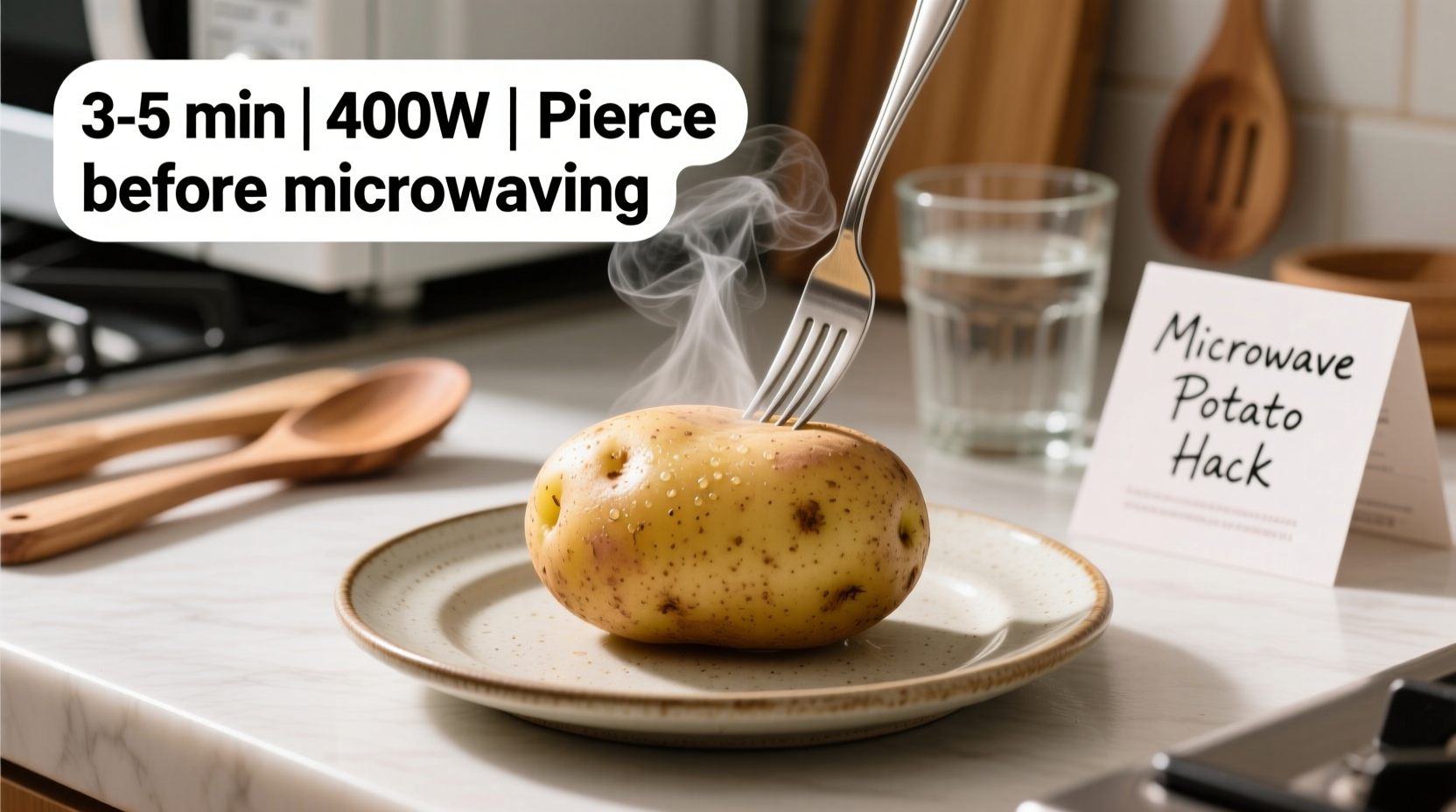Craving a quick, hassle-free potato side dish? Microwaving delivers restaurant-quality results faster than traditional methods. This guide reveals the science-backed technique professional chefs use for consistently perfect microwave potatoes - no special equipment required. You'll learn exactly how long to cook different potato varieties, avoid common safety hazards, and achieve that ideal fluffy interior with crisp skin.
The Essential Microwave Potato Method
Follow these precise steps for foolproof results every time. The key is balancing moisture control with proper heat distribution.
Step 1: Potato Selection and Preparation
Choose medium-sized russet or Yukon Gold potatoes (6-8 ounces each) for optimal microwave cooking. Larger potatoes require significantly longer cooking times and often cook unevenly. Wash thoroughly under cold water, scrubbing away any dirt. Never skip the crucial piercing step - use a fork to make 8-10 deep punctures around each potato. This prevents dangerous steam buildup that causes explosions.

Step 2: Moisture Control Technique
Place potatoes on a microwave-safe plate and add exactly 2 tablespoons of water. The water creates steam that cooks the potato evenly while preventing dry spots. Cover tightly with a microwave-safe lid or vented plastic wrap - the trapped steam is essential for proper starch gelatinization. USDA food safety guidelines recommend maintaining proper moisture levels to ensure thorough cooking at safe temperatures (FSIS, 2023).
Step 3: Precise Cooking Times
| Number of Potatoes | 600-800W Microwave | 1000W+ Microwave | Internal Temperature |
|---|---|---|---|
| 1 medium potato | 7-9 minutes | 5-7 minutes | 190-200°F |
| 2 medium potatoes | 10-12 minutes | 8-10 minutes | 190-200°F |
| 3 medium potatoes | 12-15 minutes | 10-12 minutes | 190-200°F |
Rotate potatoes halfway through cooking for even heat distribution. Check doneness by inserting a fork - it should slide in with no resistance. For perfect texture, let potatoes rest covered for 3 minutes after cooking to allow residual heat to finish the process.
Avoiding Common Microwave Potato Problems
Understanding the science behind microwave cooking prevents frequent issues:
Preventing Explosions
Explosions occur when steam builds up faster than it can escape. Always pierce deeply (1/2 inch) with multiple holes. Never wrap potatoes in airtight plastic without vents. If cooking multiple potatoes, arrange them with space between each to allow proper steam circulation.
Eliminating Soggy Texture
Excess moisture causes sogginess. Use only the recommended 2 tablespoons of water regardless of quantity. After cooking, remove the cover and microwave uncovered for 60-90 seconds to evaporate surface moisture. For crispier skin, finish under a broiler for 2-3 minutes.
Handling Different Potato Varieties
Russets work best for fluffy baked-style results due to their high starch content. Sweet potatoes require 25% more cooking time. Waxy varieties like red potatoes hold their shape better for salads but need careful timing to avoid rubbery texture. Always adjust cooking times based on your microwave's actual wattage - most home models operate at 70-80% of their labeled power.
Professional Chef's Microwave Potato Hacks
Enhance your results with these restaurant-tested techniques:
- Flavor infusion: Place herbs or garlic cloves under the potato before cooking
- Perfect seasoning: Rub skin with oil and salt before piercing for crispier texture
- Even cooking: Arrange potatoes in a circle, not stacked, for optimal microwave distribution
- Time saving: Cook multiple potatoes simultaneously with adjusted timing
Safety First: Microwave Potato Guidelines
Follow these critical safety measures:
- Always use microwave-safe containers (glass or ceramic)
- Never cook potatoes in metal containers or aluminum foil
- Allow 2 minutes resting time before handling - internal temperatures exceed 200°F
- Check for hot spots by squeezing gently with oven mitts
- Discard any potatoes showing signs of undercooking (firm centers)
Food safety experts confirm that properly cooked microwave potatoes reach safe internal temperatures that eliminate harmful bacteria when following recommended timing guidelines (WHO Food Safety, 2024).
Microwave vs. Traditional Cooking: When to Choose Which Method
Microwave cooking excels for quick weeknight meals but has limitations. Use microwave method when:
- You need potatoes in under 15 minutes
- Cooking one or two servings
- Want minimal cleanup
- Don't have oven access
Choose traditional oven baking when:
- Cooking 4+ potatoes simultaneously
- Want maximum crisp skin texture
- Preparing for special occasions
- Have time for 45-60 minute cooking process
Troubleshooting Guide
Solve common issues with these quick fixes:
- Hard center: Add 1-2 minutes cooking time, rotating halfway
- Uneven cooking: Arrange potatoes in circle pattern, not stacked
- Watery texture: Reduce water to 1 tablespoon, cook uncovered at end
- Dry spots: Increase water to 3 tablespoons, cover tightly
- Cold spots: Let rest covered 5 minutes after cooking
Conclusion
Microwave potato cooking delivers fast, reliable results when you understand the science behind proper timing and moisture control. By following these precise guidelines, you'll consistently achieve perfectly cooked potatoes with fluffy interiors and safe internal temperatures. Remember to adjust for your specific microwave wattage and potato variety for best results. This method saves valuable time without sacrificing quality - ideal for busy weeknights when you need a nutritious side dish in minutes.











 浙公网安备
33010002000092号
浙公网安备
33010002000092号 浙B2-20120091-4
浙B2-20120091-4